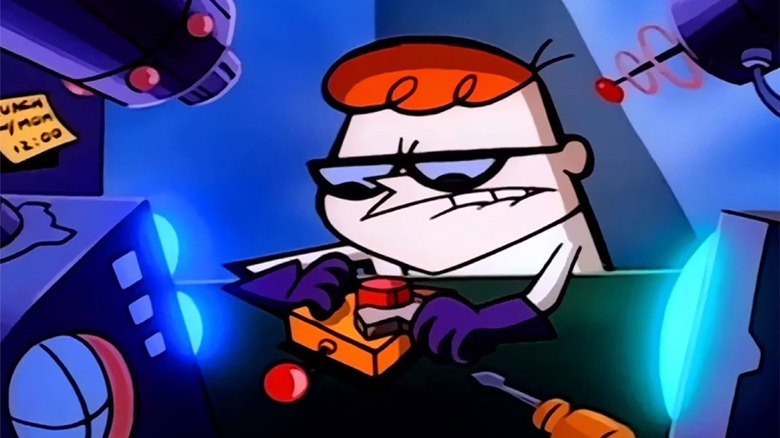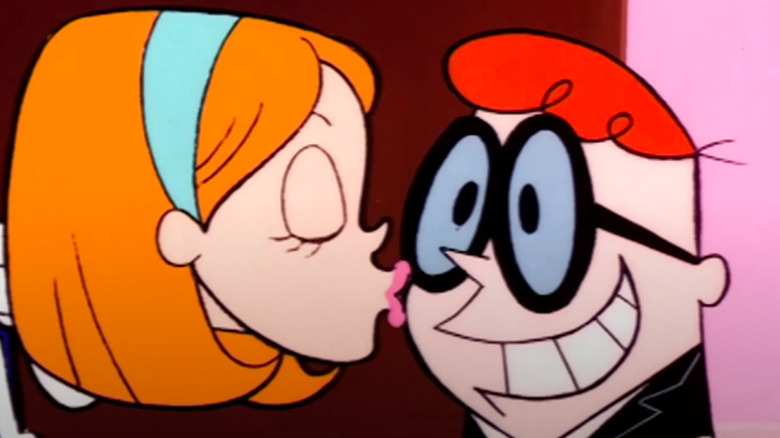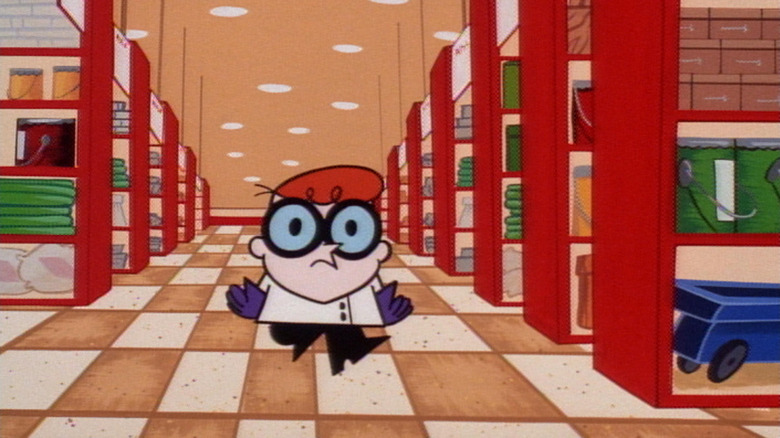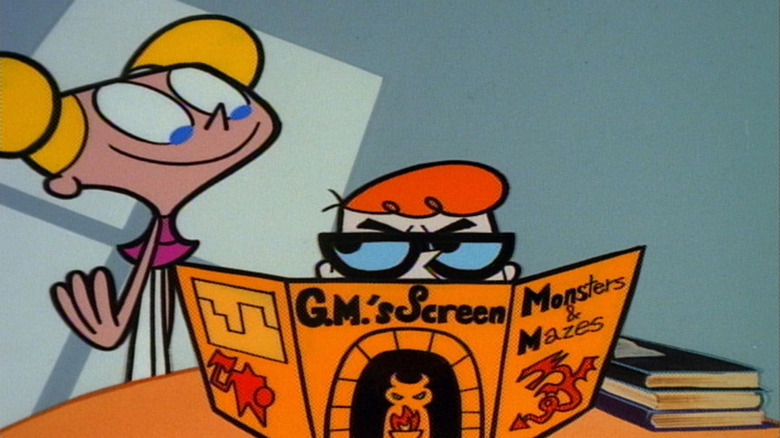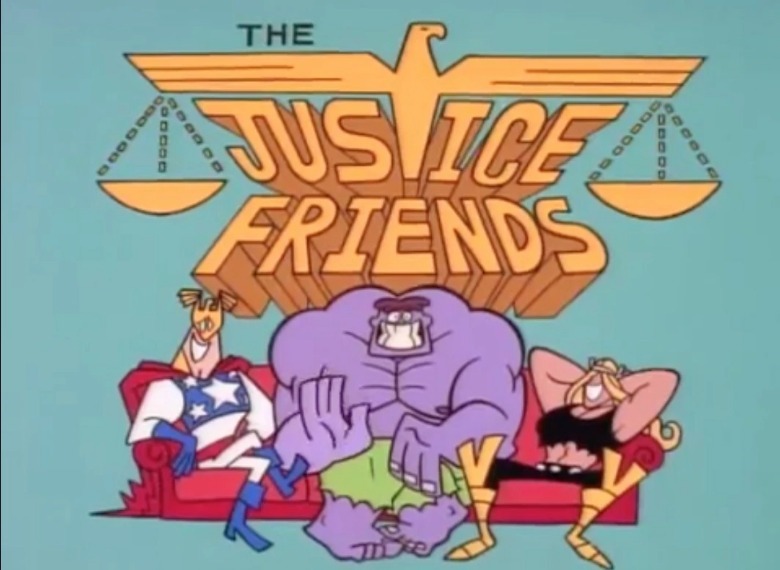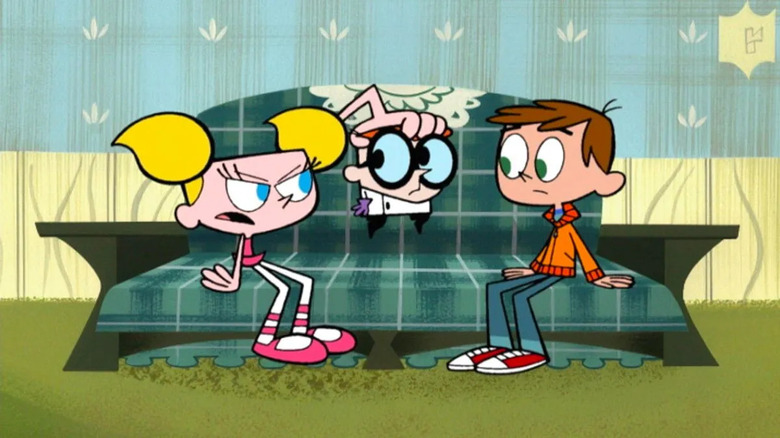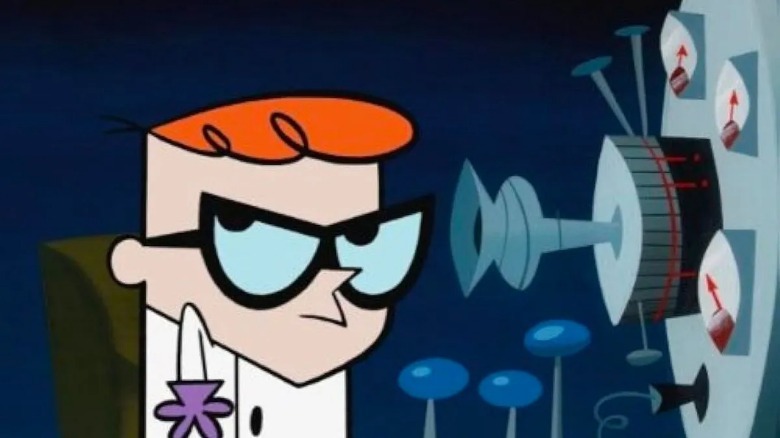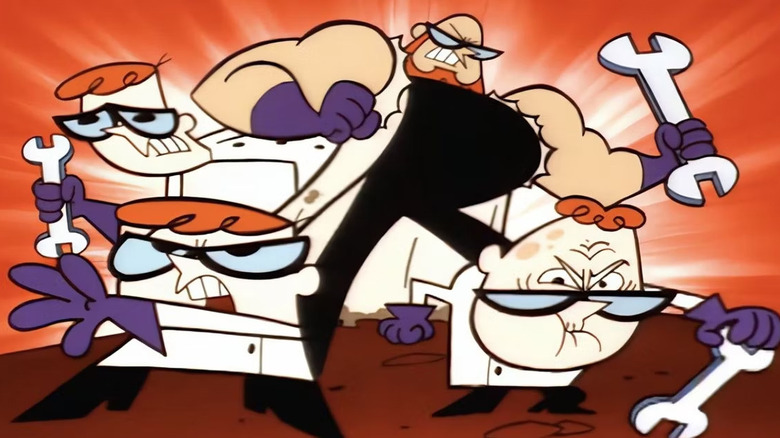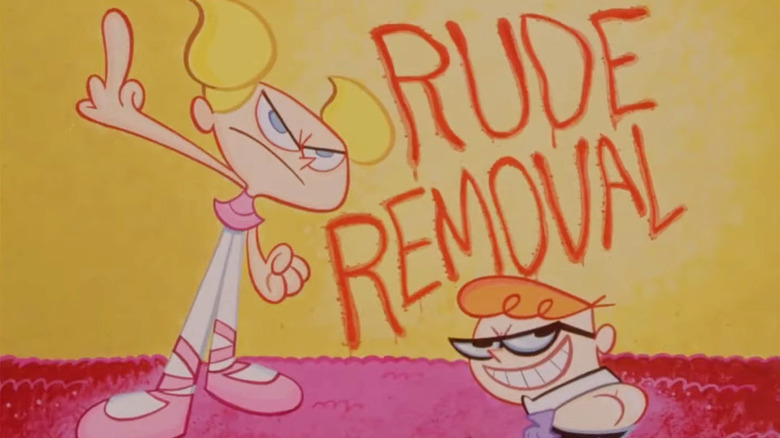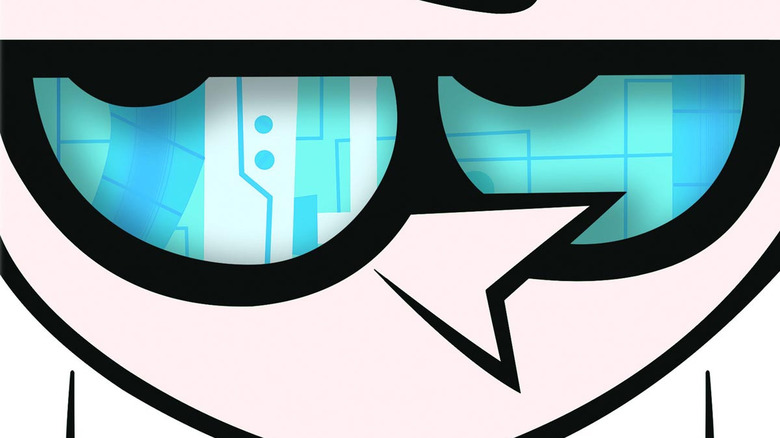One Of Cartoon Network's Best '90s Shows Finally Has A Complete Series DVD Collection
"Dexter's Laboratory" was the first in an incredible wave of original animated shows from Cartoon Network. "Cow and Chicken," "Johnny Bravo," "I Am Weasel," "The Powerpuff Girls," "Ed, Edd, n Eddy,", "Courage the Cowardly Dog," and "Dexter's Laboratory" were collectively known as Cartoon Cartoons, and they turned Cartoon Network into a popular destination for animated entertainment that landed with kids and adults alike. However, Genndy Tartakovsky is one of only two creators from this run of shows who is still making groundbreaking animation today. The other is "The Powerpuff Girls" creator Craig McCracken, who just so happened to cut his teeth working alongside Tartakovsky through much of the first couple seasons of "Dexter's Laboratory." Perhaps that's why it's so wonderful to this day.
"Dexter's Laboratory" smartly' borrows and mixes elements from the best classic cartoons. There's the slapstick comedy elements that come from "Looney Tunes," a simplistic yet effective animation style that calls back to Hanna-Barbera, and even a touch of cinematic influences from sci-fi, anime, and a variety of film genres. Furthermore, you've got the incredible work of the entire voice cast, especially with Dexter voiced by the late Christine Cavanaugh, one of the best voice actors there ever was, bringing a unique personality to Dexter with a non-specific accent that's sometimes Russian, German, or French — and it's always hilarious.
For decades now, the complete series run of "Dexter's Laboratory" has only ever been available for digital purchase or streaming on Max. However, you will find that the series isn't streaming anywhere at the time of this writing. Thankfully, for physical media fans, the series is now available to buy on DVD, and it's (almost) everything a "Dexter's Laboratory" fan could ask for.
For the love of Dexter
Today, Genndy Tartakovsky is receiving accolades for his incredible animated series "Primal," following the adventures of a Neanderthal man and a Tyrannosaurus rex as they become unlikely allies in a harsh prehistoric world filled with endless threats from both creatures and early hominids and bloody violence. But back in the mid-'90s, he was just beginning his decorated career, starting with "Dexter's Laboratory." And you can tell he poured his heart and soul into this series.
Not only was the dynamic between Dexter and his sister Dee Dee inspired by the relationship that Tartakovsky has with his older brother, but even Dexter's accent came from the creator's younger years, where he had a thick accent of his own that made him stand out as the child of immigrant parents growing up in Chicago. In fact, that element of Dexter's personality is the driving force of the entire show. As Tartakovsky once told The Jewish Journal in 2015:
"When I moved to America, I wanted to fit in and be American ... We never tried to be too heavy-handed with Dexter's, but if you look at the underlying themes of the show, it's about a little kid trying to fit in."
That's a big part of what makes Dexter so endearing as a character, when it would have been easy to make him insufferable, like his boy scientist rival Mandark (voiced by "Grease" cast member Eddie Deezen). But perhaps the most important piece of the puzzle is the voice of Christine Cavanaugh.
Christine Cavanaugh is a legend
Christine Cavanaugh may be best known as the voice of the cautious toddler Chuckie Finster on the staple Nickelodeon animated series "Rugrats," but her work as the ambitious, bespectacled Dexter deserves equal recognition. Cavanaugh makes Dexter sound simultaneously cute and arrogant, walking a very delicate balancing act that keeps the kid from being supremely annoying. Though he's always shouting at Dee Dee (voiced sweetly by Allison Moore in seasons 1 and 3 and Kat Cressida in seasons 2 and 4) for breaking into his lab and besting him at almost everything, even when he has an array of gadgets and gizmos at his disposal, he's also vulnerable and has a genuine love for his sister, as illustrated across many episodes throughout the show's run.
For me, it's Dexter's signature accent that adds to his adorable nature. The emphasis that Cavanaugh puts on certain syllables makes Dexter's speech patterns particularly funny, especially when he's angry or excited about something. In fact, it's Cavanaugh's unique performance that has made Tartakovsky totally resistant to following the trend of animated series revivals. As recently as 2022, the creator told ComicBook.com he had no interest in doing a revival of "because number one, the voice actress [Christine Cavanaugh] passed away, and she was such the soul of Dexter, I don't feel comfortable trying to replace her in a way." That's even after the third season brought in Candi Milo to replace Cavanaugh, who chose to retire from voice acting in 2001. So there's no denying that Cavanaugh is an integral part of Dexter's magic, and you can see why in the complete series run.
Dexter's Laboratory's confusing season organization comes from streaming
If you're looking to watch "Dexter's Laboratory" the right way, it's going to take some work. That's because this home media release of the series is organized in the same way it appeared on streaming, which means the show is broken down into six total seasons, rather than as four seasons, which is how it's been broken down in episode guides for years. There's no real rhyme or reason to this organizational approach other than to perhaps make it feel like the series has more episodes spread out across more seasons. But no matter how you break it down, all 78 episodes are included in this complete DVD set, along with the hour-long episode "Dexter's Laboratory: Ego Trip" (more on that later).
The original series ran for an initial two seasons comprised of 52 episodes that aired between 1995 and 1998, including four different pilots that aired on TNT and Cartoon Network in 1995 and 1996. All of those episodes have been organized into the first seasons in the DVD set. However, if you compare the episode guide insert to the information available online, they're not organized by airdate. The pilots are sprinkled throughout the first season discs, and the actual premiere episode that followed isn't the first episode in the set either. Strangely enough, they're also not organized by the episode production code either.
The DVD set also includes the additional 26 episodes that were ordered after interest in the series remained following "Dexter's Laboratory: Ego Trip," which acted as a series finale of sorts. Unfortunately, by this time, Genndy Tartakovsky had moved on to "Samurai Jack," Craig McCracken was working on his own "Powerpuff Girls" series, and much of the original animation team had moved on because the legendary animation studio Hanna-Barbera had closed, and Cartoon Network Studios shifted from being under their umbrella to their own division at to the Warner Bros. Animation, while Hanna-Barbera existed only in name. Chris Savino took over for what is known as seasons 3 and 4 (more on that below), and those episodes are actually collected as seasons 5 and 6 in the complete DVD set. While these are a little better organized than the other episodes, they're still not all completely in order either.
The first four seasons of Dexter's Laboratory are classic
There's no denying the greatness of "Dexter's Laboratory" in what is being labeled the first four seasons of the series. Along with the hilarious bickering between Dexter and Dee Dee as he tries to keep her out of the lab, Mandark makes for an amusing rival for Dexter, a dynamic that changes slightly in the later seasons that doesn't work quite as well.
Plus, we also have the interstitial adventures featuring the Justice Friends, a satirical riff on the Avengers where Major Glory (Rob Paulsen), Valhallen (Tom Kenny), and Infraggable Krunk (Frank Welker) live everyday superhero life in sitcom form, complete with a laugh track. Personally, I always thought this would have fit better with the "Powerpuff Girls" series, but since Dexter is a fan of Justice Friends and Major Glory appears in an early episode, their inclusion makes sense.
That's not the only superhero presence in the early seasons either. If there's not a Justice Friends segment, then there's a Dial M for Monkey segment, which follows Dexter's pet monkey, named Monkey, as he goes on secret adventures as a superhero also named Monkey. Again, this feels like it would have fit better with "Powerpuff Girls," but giving Dexter's monkey his own secret to keep within Dexter's secret laboratory is fairly amusing.
What's particularly great about these early seasons is the sharp sense of humor, including jokes that went over kids' heads, and the cinematic animation style that borrows elements from major motion pictures and anime. Despite a more simplistic animation style, both the score and the artwork made the series feel like it had a much larger scope. Plus, there are episodes directly inspired by movies like the action classic "Die Hard" and the groundbreaking Disney movie "TRON," just to name a couple.
But again, all of this works extremely well because of Christine Cavanaugh's unique voice as Dexter. She has the ability to make Dexter extremely funny, especially in moments of panic and anger, but he can also be incredibly sweet and vulnerable. There's a reason this era of the animated series influenced so many other cartoon creators and still stands the test of time to this day.
The last two seasons of Dexter's Laboratory aren't great
On the other end of the spectrum, we have the later two seasons of "Dexter's Laboratory." Overseen by Chris Savino, these seasons saw some slight changes to the character designs, primarily larger more expressive eyes. Dexter's Dad is the one who was given the biggest design change, but each of the characters has something about them that just feels off.
Plus, the animation in general has a more vibrant and crisp feel because it shifted into digital animation. The original run of the series was done with cel animation, which ends up on film. The intentional style limitations of the original cartoon combined with the grain of the film gives it a much more tangible feel. But something about the digital versions of these characters feels too clean cut. Dee Dee's big blue pupils no longer bleed over the whites of her eyes, and the line work is much more precise. That translated to the backgrounds too, which became much more detailed versions of Googie-inspired artwork. It bordered on looking like "Ren & Stimpy" at times.
On top of that, the writing was never as good as those original seasons. It feels like there are a lot more episodes that don't have anything to do with Dexter's lab or his own ambitions. Overall, the series feels like it lacks cleverness in these later seasons, especially without much of the cinematic action that made the original series so much fun. There's a lot more reliance on dialogue between characters for jokes, and the laughs are much more sparse.
But perhaps the hardest hurdle to overcome is the lack of Christine Cavanaugh. She retired from voice acting in 2001. You'll hear her voice for the first six episodes of season 5, but after that, she's replaced with Candi Milo. Not to besmirch Milo, who is a very talented voice actor in her own right, but she doesn't quite nail the energy and heart of Dexter. First, her voice is a little too high-pitched, making Dexter sound more like a little girl than a young boy. Plus, she can't consistently perfect the cute growl that Cavanaugh brought to her speech. It's still there, but it doesn't feel as natural. Combine that with the rest of the changes, and these revival episodes just can't measure up to the staying power of those original episodes.
Dexter's Ego Trip provides a satisfying ending, but is it the best?
Aside from collecting all of "Dexter's Laboratory," for better and worse, the most satisfying inclusion in this complete series set is the hour-long episode "Dexter's Laboratory: Ego Trip." The TV movie was originally meant to act as a finale for the series, but it ended up sparking much more interest, hence the series revival that ended up moving forward. This has not been made available on physical media, and it's not streaming anywhere. It's rarely been so readily available, and it's absolutely one of Tartakovsky's crowning achievements from the entire series.
In "Ego Trip," Dexter travels to the future after being mistaken for the person who somehow saved the future. But Dexter finds himself in a world where Mandark is not only rich and successful, but also Dexter's boss. As Dexter travels through time in an attempt to figure out how this happened, he meets various future versions of himself, and they all team up to stop Mandark's oppressive rule that spans many years. Of course, Mandark calls upon various versions of himself, and a big battle ensues. In typical fashion, Dee Dee ends up being the one who actually saved the future, continuing the endless frustration that Dexter has with his sister, who is clueless as to what she's actually accomplished.
This was the last production that came from the original creative team, though there are some visual flourishes that would end up creating an surprising bridge to the revival. It's also the last one produced with cel animation, so it still serves as a perfect farewell. In fact, the special episode benefits from being at the very end of the complete series DVD set, which basically solidifies it as an overall series finale. It's significantly better than what was the actual series finale, an episode titled "2Geniuses 2Gether 4Ever," where Dexter makes it seem like he's giving his lab to Mandark, emphasizing that it's not a big prank. While there's a solid gag that references the show's opening credits title screen, bringing the entire series full circle, the episode as a whole still isn't as clever as when "Dexter's Lab" was at its best.
However, when you're watching the tail end of the original series run, the episode "Last But Not Beast" also acts as a sturdy finale. It's the only time the entire runtime of an episode was used for a single segment, and that's because it basically acts as an Avengers-style crossover that combines every element of the series. After Dexter's show-off attitude unleashes a giant monster while he's attending an exchange school in Japan, the Justice Friends, Monkey, and even Dexter's parents are brought in to help defeat the monster. Yes, Dexter actually reveals his secret lab to his parents in this episode, which helps to make it feel like a big finale. While "Ego Trip" feels like it offers Dexter's story a bit more finality as a character, "Last But Not Beast" is a big episode that has a lot of fun with all of the show's characters.
What's missng from the Dexter's Laboratory complete series on DVD?
This is the most complete version of "Dexter's Laboratory" that we'll probably ever see on physical media, but it's stilling missing two key segments.
First, there's a "Dial M for Monkey" segment called "Barbequor" that didn't make it into the set. But this episode has been excluded from the series for a long time now, including the initial DVD release of the show's first season (though it did make it onto the Region 4 release overseas). For awhile, it was believed that the episode was banned because it features a character known as Silver Spooner as a stereotypical gay man, not to mention Krunk getting drunk. But it has since been revealed that the show's writers received copyright infringement threats from Marvel Comics, because Silver Spooner was intended to be a riff on Silver Surfer, with Barbequor being a proxy for Galactus.
The other missing episode, or rather segment, isn't really missed, because it was never officially released. "Rude Removal" was made for the show's second season, but it never aired. The segment finds Dexter trying to remove rudeness from Dee Dee, but of course, their bickering results in a malfunction that splits Dexter and Dee Dee each into two halves. One half is well-behaved with British accents, the other half is rude with a New York dialect and speaks with bleeped profanity. Though censored, apparently standards didn't like the edginess of the episode, so it never made it to air. However, it has screened at animation festivals and conventions, and it ended up on Cartoon Network's Adult Swim website and official YouTube channel in 2013, but it can now only be found through unofficial online channels.
Is Dexter's Laboratory complete series DVD set worth buying?
Considering this is the first time that "Dexter's Laboratory" has ever been made available on physical media in its entirety, that immediately makes this worth owning. Add in the fact "Ego Trip" is included, and this is a must-have. Granted, there are zero special features on the release, which is a bit of a bummer. For such an influential show that sparked an entire wave of successful animated shows at Cartoon Network, it would have been nice to have some featurettes or some kind of retrospective, but it's just simple menus with all the episodes available, and that's it.
While it's frustrating that the DVD set has adopted the strange organization of the show's presentation on Max, and it will require some jumping around to watch the episodes in the correct order, this is still the best quality you'll find of the entire series. Plus, aside from the fact that the show looks great, even with just a DVD release instead of Blu-ray, the series is no longer streaming on Max or anywhere else. So having the physical copy of the entire series means you can enjoy it whenever you want.
"Dexter's Laboratory: The Complete Series" is available to buy right now for $50.
